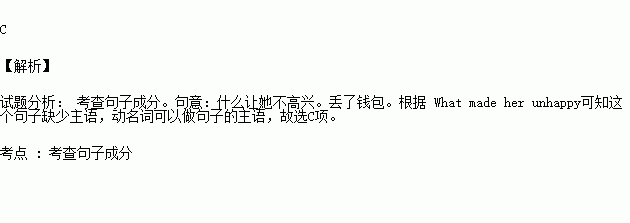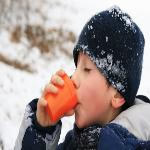题目内容
---What made her unhappy?
---_____.
A. Because she lost her wallet B. she lost her wallet
C. Losing her wallet D. To lose her wallet
A schoolgirl saved her father's life by kicking him in the chest after he suffered a serious allergic (过敏的) reaction which stopped his heart.
Izzy, nine, restarted father Colm's heart by stamping (踩) on his chest after he fell down at home and stopped breathing.
Izzy's mother, Debbie, immediately called 999 but Izzy knew doctors would never arrive in time to save her father, so decided to use CPR.
However, she quickly discovered her arms weren't strong enough, so she stamped on her father's chest instead.
Debbie then took over with some more conventional chest compressions (按压) until the ambulance arrived.
Izzy, who has been given a bravery award by her school, said: "I just kicked him really hard.My mum taught me CPR but I knew I wasn't strong enough to use hands.I was quite scared.The doctor said I might as well be a doctor or a nurse.My mum said that Dad was going to hospital with a big footprint on his chest.”
"She's a little star," said Debbie, "I was really upset but Izzy just took over.I just can't believe what she did.I really think all children should be taught first aid.Izzy did CPR then the doctor turned up.Colm had to have more treatment on the way to the hospital and we've got to see an expert."
Truck driver Colm, 35, suffered a mystery allergic reaction on Saturday and was taken to hospital, but was sent home only for it to happen again the next day.The second attack was so serious that his airway swelled, preventing him from breathing, his blood pressure dropped suddenly, and his heart stopped for a moment.
He has now made a full recovery from his suffering.
1.From the passage, which of the sentences about Debbie is true?
A.She thought it useless to teach children first aid.
B.She thought if her daughter became a doctor, she would kick him harder.
C.She did nothing to help her husband.
D.She was proud of her daughter.
2.Izzy kicked her father in the chest ______ .
A.to express her helplessness
B.to practise CPR on him
C.to keep him awake
D.to restart his heart
3.What's the right order of the events?
①Izzy kicked Colm. ②Debbie called 999. ③Izzy learned CPR. ④Colm's heart stopped. |
A.3124
B.4231
C.3421
D.4312
4.What does Paragraph 8 mainly talk about?
A.What Colm suffered.
B.Colm's present condition.
C.What caused Colm's allergy.
D.Symptoms of Colm's allergic reaction.
5.Why does the author write the news?
A.To describe a serious accident.
B.To prove the importance of CPR.
C.To report a 9-year-old girl's brave act.
D.To call people's attention to allergic reaction.


